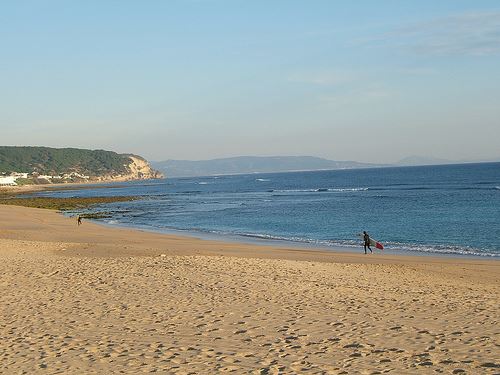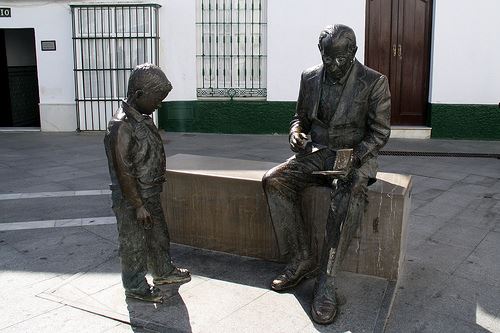Legal tip 716. FREE guide on Community of Owners Q&A
Wednesday, February 29, 2012

"Chiclana", Cádiz, Spain, by alvarezperea, at flickr.com
 0
Like
Published at 10:11 AM Comments (0)
0
Like
Published at 10:11 AM Comments (0)
Legal tip 715. It is SAFE to buy in Spain, believe me it is
Monday, February 27, 2012
A small conversation from the blog today:
Reg said:
24 February 2012 @ 16:24
Maria,
"In terms of legalities: Buying an already built property is a completely safe option in Spain. "
This is total nonsense. SOHA and AUAN already did a test on three houses, all with PERFECT paperwork. It transpired that ALL THREE had pending demolition orders! Demolition orders and perfect paperwork and online records.
Spain is a joke.
Reg said:
27 February 2012 @ 11:16
No comment, Maria?
María said:
27 February 2012 @ 11:43
Reg,
I do agree that the real filter by Notaries and Registrars on existence of licenses did not exist till 2008, when the new Land Act established concrete obligations for these in order to not authorising public contracts of ownership transfers and not to register them previous verification of existence of the corresponding habitation licenses.
So, yes, buying already properties in Spain registered in the Land Registry with the help of a good specialist lawyer is a safe option! :)
Kindest regards,
Maria
.jpg)

"Atardecer en Chiclana 9", Beach "La Barrosa", Chiclana, Cádiz, Spain, by sergi.gisbert, at flickr.com
 0
Like
Published at 1:12 PM Comments (11)
0
Like
Published at 1:12 PM Comments (11)
Legal tip 714. FREE legal guide on Timeshare Law in Spain
Friday, February 24, 2012

"Surferos en Trafalgar....en Los Caños de Meca y con la Costa Africana al fondo", Cadiz, Spain, by Manuel Acebedo: El Viajero de La Janda Litoral, at flickr.com
 0
Like
Published at 1:26 PM Comments (0)
0
Like
Published at 1:26 PM Comments (0)
Legal tips 713. Re-invest in Spain
Thursday, February 23, 2012
This post is really a steam letting-off
I dream of this. I know. I have already said this to you many times since 2008.
But as Spain is my country and I know well the goodness of it, I cannot avoid to feel a pain every time we obtain a refund and send money back abroad.
I feel the passion for you to come over again, we need you. We will make you happy!
There are real bargains in Spain these days. As soon as the euro crisis is over I am sure prices will start rising again. So, it is the time. Believe me.
I know someone who is buying an office of around 70 m2 in Algeciras for 30k. Is it not incredible?
Anyhow! Have a good evening...
Maria
.jpg)

"Faro de Trafalgar en Los Caños de Meca, Barbate (Cadiz)", Spain, by Manuel Acebedo: El Viajero de la Janda Litoral, at flickr.com
 0
Like
Published at 4:35 PM Comments (3)
0
Like
Published at 4:35 PM Comments (3)
Legal tip 712. Light measures pro dación en pago
Thursday, February 23, 2012
Just as a "recommendation " in a manner of " Bank´s good practise", the government advised yesterday to financial institutions to accept " daciones en pago " (keys bak to the bank) in cases where the whole family is unemployed and the house is the first and only residency.
Too light in my opinion as the Spanish Civil Code already offers these rights in a clear way to debtors.
The governemnt is also promoting extrajudicial foreclosures, and online auctions. It is also softening the hard effects of evictions by encouraging Banks to let evicted people to stay at the house for at least two years.
Government is offering tax benefits to Banks following this advise.
Hum.... I am afraid this is too complacent to Banks, which in general do not follow light advises or recommendations. How they? if they are confident enought to not to obey Law in many occassions...
I am more and more convinced that the big legal battle of the coming years is about reducing Bank´s power and putting them for real under Law and democratic legitimacy.
It seems that we people, protected by good lawyers, will be leading the crusade. Judges seem to understand it too. Good for those judges!
It is a so nice challenge!
.jpg)

"Los Caños de Meca en Barbate (Cadiz)", Spain, by Manuel Acebedo: El Viajero de la Janda Litoral", at flickr.com
 0
Like
Published at 1:16 PM Comments (0)
0
Like
Published at 1:16 PM Comments (0)
Legal tip 711. Re-edited answers for community of owners 11.
Wednesday, February 22, 2012
73. We are a group of 30 villas. Can we form a Community of owners?
Yes, you can, as the Horizontal Property Act can be applied to developments under these requirements:
-
To be integrated for 2 or more buildings or plots which are independent of each other, composed of apartments or premises.
-
The owners of the apartments and premises which are “horizontally divided” have inherent co-property rights on the common elements of the building.
74. What about the blocks of apartments next to us, of same development... can they be integrated I our Community?
In that case, you can decide between:
-
Being set up as an individual Community of Owners.
-
Being set up as a “Communities of Owners Association”. In this case, they will be submitted to the regulations of the Horizontal Property Act, with the following particularities:
-
The Constitutive title of the new grouped Community must be conferred by the unique owner of the complex ( developer) or by the presidents of all the communities that will integrate it, previously authorized by a majority agreement of their respective meeting of owners.
-
The Meeting of owners is composed, if not agreed otherwise, by the Presidents of the communities integrated in the group, who will be the representatives of their correspondent community at every Associations meeting.
-
The adoption of agreements for which specific majorities are required, need to have in any case, the previous obtaining of that specific majority in every one of the associated Communities.
-
A reserved fund is not required for the Association.
-
The governing body of the Association only can decide about the elements of the building, lines, installations and common services.
-
Its agreements can not limit the faculties that corresponded to the governing body (General Meeting, President, Secretary, etc.) of the communities of owners integrated in the association of the communities
-
.jpg)
-

"Los Caños de Meca en Barbate (Cadiz)", Spain, by Manuel Acebedo: El Viajero de la Janda Litoral, at flickr.com
 0
Like
Published at 11:02 AM Comments (0)
0
Like
Published at 11:02 AM Comments (0)
Legal tip 710. European Code of Ethics for Real Estate Professionals
Tuesday, February 21, 2012
adopted by the General Assembly of March 30, 2006 in Brussels
Contents
1. Preamble
2. Definitions
3. Code of Ethics
3.1. General
3.2. Relations with clients: charter on quality care
3.3. Relations with colleagues
4. Financial aspects
4.1. Financial Guarantee and Professional Liability Insurance
4.2. European Directive on the prevention of the use of the financial system for the purpose of money laundering including terrorist financing
4.3. Code of Conduct for real estate professionals in the field of e-commerce
5. Mutual recognition of the ability to exercise the profession
6. The European Chamber of Arbitration, Mediation and Discipline for Real Estate Professionals
6.1. Purpose
6.2. Composition
6.3. Conditions of eligibility
6.4. Chamber of Arbitration and Mediation
6.5. Chamber of Discipline
6.6. Organisation
6.7. Fees paid to the clerk
6.8. Procedure
1. Preamble
The EU Member States comprise some 320,000 real estate professionals (property agents ‹*› and managers) employing some 1.2 million wage earners.
Around 2/3s of these professionals belong to national trade organisations.
In some countries, there are more or less restrictive regulations, in others outdated ones.
The activities of property agents and managers require increasingly more rigour, professionalism, in-depth knowledge in areas as varied as law, taxation, insurance, economics, accounting, building technologies, sociology, financing mechanisms, information technology, town planning, regional planning, etc. Furthermore, this knowledge must be constantly updated by continuing training.
As a result, a non-negligible number of players in the property sector may not have all the guarantees needed to protect the consumer.
In the spirit of the Single European Act and having regard to the responsibilities which are incumbent upon real estate professionals as a result of the civil, economic and social role allotted to them, we establish the principles of a common Code of Ethics gathering the principles of conduct and ethics of their professions.
Each professional is bound by this code provided it does not conflict with the national legislation.
The rules aim to ensure to the consumer the best guarantees and quality of services in the interest of the common good and for the conservation of the professional inheritance for future generations.
Each member organisation whilst rigorously respecting the spirit of the code, may adapt it to the specific professional circumstances within its own country.
‹*› also called estate agent or broker.
^
2. Definitions
A Property Agent shall be understood to mean any service provider on behalf of third parties, who is acting in the interests of the latter for selling, purchasing, exchanging, renting or transferring real estate goods, real estate rights or business.
A Property Manager shall be understood to mean any person who, habitually as his principal or secondary activity and acting on behalf of third parties, in a capacity of authorised agent or intermediary, either manages real estate rights or acts as a property manager for flats in co-ownership.
^
3. Code of Ethics
3.1. General
In practicing his profession, the real estate professional shall show competence by justifying the requisite qualities and guarantees.
He/she shall:
• keep regularly abreast of essential legislation, information and developments likely to have an influence on the interests entrusted to him;
• be familiar with the conditions of the markets in which he has to advise his clients;
• not accept any mission that exceeds the scope of his experience, except to make sure, with the consent of his client, the support of a specialist, the limits of action of which shall be clearly defined;
• inquire into all essential elements relative to each property for which he accepts a remit, so as to meet his obligations to avoid error, exaggeration, wrong presentation or concealment of the facts;
• remain abreast of and facilitate the training of his employees as to the development of the real-estate market at local, regional, and national levels;
• attend, and have his employees attend, continuing, specific training courses that enables them to adapt to developments of the relevant legislation and professional environment.
3.2. Relations with clients
In his relations with clients, the real estate professional shall act with:
Professional conscience
He/she shall:
• display the professional conscience required to carry out the mission entrusted to him;
• show moderation and exercise caution, making sure not to imperil the situation of his clients or his own;
• protect and promote the legitimate interests of his clients; the duties of advice and absolute loyalty to the latter shall not, however, dispense the real estate professional from treating all the parties interested fairly, with respect for their rights;
• protect the consumer against fraud, wrong presentation or incorrect practices in the real estate sector, and shall endeavour to eliminate, in his community, any practice likely to cause prejudice to the public or to the dignity of the profession of property manager or property agent.
Professional discretion
He/she shall:
• consider himself/herself to be required, under any and all circumstances, to observe absolute discretion with respect to his/her clients and third parties, for everything to do with his remit, and shall ensure that his/her employees act with the same reserve.
Integrity
He/she shall:
• not acquire, in whole or in part, nor have a property acquired by a near relation or any organism in which he/she holds a stake, for which he/she has been given a remit, unless he/she informs his/her client of his/her intention beforehand;
• inform the buyer of his/her position in the event that property belonging to him/her, in whole or in part, is put up for sale;
• shall not accept valuation or assessment missions for a property in which he/she holds or intends to acquire interests, unless he/she duly so indicates in his/her valuation or assessment report;
• not receive any commission, reduction or profit on expenses incurred for the account of a client, without having obtained the prior consent of the latter, whereby the arrangements for choosing suppliers and the invoicing for their products or services should be transparent;
• not order, for the account of a client, works, supplies or services from a close relation or an organisation in which he/she holds interests, without information the client of his/her position;
• not put up for sale or to let, or manage a property without having been duly assigned to do so in writing;
• not discriminate on the basis of race, beliefs, sex or origin;
• accomplish all formalities and provide the requisite information to the parties;
• act with full transparency in regard to the parties;
• use the means of information and advertising relative to the sale/purchase and/or rental, by complying with the rules and customs with regard to the parties and his colleagues;
• undertake to transmit to the client all information and proposals relative to the sale or rental.
Fairness
He/she shall:
• ensure that the financial obligations and commitments resulting from the property contracts are fixed in writing, laying down the agreements concluded by and between the parties, each of which shall receive an original of the deed at the time of the signing thereof;
• ensure that the agreements provide, unequivocally, flawless information to the parties and tend to harmonise their interests, without either drawing the advantages alone;
• inform the public with precision as to the price asked by way of remuneration for the services rendered;
• ensure that any ancillary or related activities are carried out in complete transparency and do not cause any conflict of interest.
3.3. Relations with colleagues
Fraternity between colleagues
He/she shall:
• see to the fairness of competition, in particular when commencing or terminating relations with a client;
• ensure that fraternal relations with colleagues are always marked by courtesy and respect;
• not take the initiative of criticising the professional practices of a colleague;
• if consulted on a matter handled by a colleague, give an opinion only with due fraternal courtesy and integrity for that colleague;
• maintain the profession at the highest level by encouraging vocational training;
• contribute to the publication of specialised trade journals and reviews to enable real estate professionals to provide precise information to the public;
• refrain from any practices detrimental to the reputation of the profession and any behaviour likely to cause moral or material prejudice to his colleagues;
• in order to contribute to the quality of the profession, share with his/her colleagues the fruits of experience acquired and improve the professional qualities of his/her employees with a view to improving both those employees and the quality of the service rendered;
• shall not solicit the services of an employee of a colleague, without the knowledge of the latter;
• avoid any conflict with a colleague that could injure the interests of the clients.
^
4. Financial Aspects
4.1. Financial Guarantee and Professional Liability Insurance
Property agents, if they collect funds deposited on behalf of their clients, and property managers must be covered by a financial guarantee - if it is in conformity with the national rules - and, in any case, by a professional liability insurance against:
• The liability he/she may incur regarding funds held in escrow or other funds entrusted to his/her care.
• The liability the property agent or the property manager may incur carrying out his business as a property agent or as a property manager.
• The financial guarantee and the liability insurance may be issued by a mortgage bank, a commercial bank, an insurance company, a specialised finance company or any other company, which is legally authorised to fulfil such obligations.
• The size of the financial guarantee, and of the civil liability insurance coverage, may never be less than € 25,000 and € 200,000 respectively.
• A certificate attesting such guarantees must be displayed at the most visible place at each place of business and, if the business is carried through the internet at a visible place on the website.
4.2. European Directive 91/308/EC amended by Directive 2001/97/EC adopted on December 4, 2001 on the prevention of the use of the financial system for the purpose of money laundering including terrorist financing
The real estate professional commits himself/herself to abide the Directive of the European Council and following European legislation.
4.3. Code of conduct for real estate professionals in the field of e-commerce
4.3.1. Definitions and scope of application
4.3.1.1. Definitions
For the purposes of this code of conduct, the following definitions shall apply:
• e-commerce: commercial activities, communications and transactions carried on, made or concluded using electronic means;
• consumer: any natural person who is acting for purposes which are outside his/her profession or business;
• electronic signature: data in electronic form which are attached to or logically associated with other electronic data and which serve as a method of authentication.
4.3.1.2. Scope of application
Real estate professionals shall apply these rules of good conduct in their e-commerce business relations, in all situations and in all their dealings with clients.
4.3.2. General provisions
4.3.2.1. General principles
• Real estate professionals shall conduct their business activities in a way that is transparent, and ensure that they respect all applicable legal provisions, all codes of conduct to which they have adhered, the confidentiality of personal data and intellectual property rights.
• They shall respect their commitments and ensure that information provided is accurate and that the procedures used for concluding contracts and making payment are secure. The level of protection offered to clients pursuant to these principles shall be equivalent to that which such clients would enjoy in the framework of traditional transactions.
• Real estate professionals can only guarantee to satisfy in full their commitments if clients communicate complete and correct information to them.
4.3.2.2. Information on real estate professionals and their company
The following information, as well as any other information that may be deemed useful and relative to real estate professionals, shall be readily and directly accessible on a permanent basis:
• the name of the real estate professional and, if applicable, the name and legal form of his/her company
• the full address of the company’s headquarters
• the real estate professional’s contact details, including his/her e-mail address, so that he/she may be contacted rapidly and with a view to ensuring direct and efficient communication
• the different legal registration numbers
• the VAT number
• if applicable, the authorisation and/or certification, as well as information on the body or bodies that issued such.
4.3.2.3. Pre-contractual information
At the time of any offer, the following information, as well as any other information deemed useful, shall be communicated to the client in a way that is clear and comprehensible:
• the identity and full address of the real estate professional and, if applicable, those of, his/her company
• a precise description of the property and of the service
• the price of the property and of the service provided; the prices shall be indicated in euros
• payment terms and the terms and conditions for the implementation of the contract
• the existence or absence of a right of renunciation
• the duration of the contract and whether or not there is the possibility of renewal by tacit agreement
• the means of payment and the currencies accepted
• the general terms which will apply; these shall be identifiable as such, easily accessible and drawn up in the languages used on the site
• the complaints procedure and any extrajudicial means of settling disputes
• the competent jurisdiction
• the governing law.
4.3.2.4. Information to be provided
All messages communicated by real estate professionals, or emanating from their company, shall satisfy the following conditions:
• they shall be clearly identifiable as such
• the natural or legal person on whose behalf they are made shall be clearly identifiable.
4.3.2.5. Security of real estate transactions
With a view to ensuring the reliability and security of real estate transactions, real estate professionals shall take all reasonable measures in terms of their organisation and the computer and communication systems used.
Clients shall be informed of the forms of electronic signatures accepted by the real estate professional, as well as, if applicable, the independent organisations that have certified such electronic signatures.
The attention of clients shall be drawn to the need to take action to protect the confidentiality of data used for the creation of an electronic signature (for example: code, private key, etc.).
Real estate professionals shall use secure procedures for the transfer of data, in particular those relative to payment.
4.3.2.6. Links with other sites
When real estate professionals establish links with other sites, they shall indicate clearly to the client that those sites do not necessarily offer the same degree of protection to the client. In addition, they shall specify that the real estate professional is not liable for the content of the said sites or the degree of security that they offer.
4.3.2.7. Complaints and the settlement of disputes
Real estate professionals shall make available to their clients detailed information on the handling of any claims and, if applicable, on the extrajudicial procedures for settling such disputes.
This information shall be provided in the language chosen by the client for the consultation of the site and the signature of the contract.
A client wishing to make a complain, should be invited to contact initially the real estate professional whose contact details shall be communicated in accordance with the articles. The complaint shall be dealt with by the real estate professional as quickly as possible.
If the client is not satisfied with the answer and/or the amicable arrangement proposed by the real estate professional, then the client may, if applicable, refer the case to the competent legal or extrajudicial body mentioned in art. 6.
4.3.2.8. Conclusion of the contract
Before signing a contract, the client shall receive a complete copy of the contract in question.
Until such time as the contract has been concluded and definitively confirmed, the client shall have the possibility to correct, at any time, any errors observed.
To that end, real estate professionals shall organise the procedure relative to the conclusion of the contract in two stages:
• first stage: agreement on the contract’s content
• second stage: signature of the contract.
Real estate professionals shall acknowledge receipt of the signature of the contract in the shortest possible time. The contract shall then be transmitted to the client in paper format.
The contract must include at least the following provisions:
• the complete identity of the parties to the contract
• the full address of the parties to the contract
• the rights and obligations of the parties to the contract
• an as accurate as possible description of the purpose of the contract
• an as accurate as possible description of the real estate professional’s tasks and responsibilities
• the duration of the contract
• whether or not there is a possibility to renew the contract by tacit agreement
• the real estate professional’s fees and payment terms
• any other information necessary for the correct performance of the contract.
4.3.2.9. Payment
Real estate professionals shall in no circumstances accept payment, in any form whatsoever, before the contract has been signed.
4.3.2.10. Protection of personal data
The client’s personal data shall be processed in accordance with the applicable law on the protection of personal data.
In particular, they shall be:
• processed accurately and legally;
• collected for specific, explicit and legitimate purposes and may not be processed subsequently in a way that is incompatible with such purposes;
• appropriate, relevant and not excessive with regard to the purposes for which they are processed;
• exact and, as far as possible, kept up-to-date;
• kept in a form that enables the persons concerned to be identified for a period not exceeding that necessary for the accomplishment of the purposes for which they are processed or not exceeding the legal time limit for keeping data in accordance with the legislation of the country in which the transaction is effected.
Information concerning the processing of data - data processed, purposes, etc. - shall be provided to clients, who may obtain access to their data and, if applicable, correct such data. Clients shall be informed of this right and the way to exercise it.
Clients may object to their data being communicated to third parties for direct marketing purposes.
^
5. Mutual recognition of the ability to exercise the profession
Without any prejudice to the national legal conditions, which might be stricter, the real estate professional commits himself/herself to abide by the minimum educational requirements of art.15 of the European Directive on mutual recognition of professional qualifications.
^
6. The European Chamber of Arbitration, Mediation and Discipline for Real Estate Professionals
^
Caution
These regulations organise the functioning of the European Chamber of Arbitration, Mediation and Discipline and is competent to deal with professional conflicts among real estate professionals from different EU States or European Economic Area who are a member of professional organisations, which are CEPI members.
6.1. Purpose
6.1.1.
A European Chamber of Arbitration, Mediation and Discipline is to be established in CEPI, with its registered office in the premises of CEPI.
6.2. Composition
6.2.2.
The ECAMD shall be composed of five Councillors who shall elect a President, two Vice Presidents, a Treasurer and a Secretary from among their ranks.
For arbitration purposes, the chamber shall be composed of three Councillors chosen by the parties involved in the case. For mediation and discipline purposes, the chamber shall be composed of three Councillors appointed by the President of the ECAMD.
6.2.3.
The Councillors shall be elected during the statutory General Assembly of CEPI from among candidates for these positions nominated by the board of directors – upon proposal of the member associations of CEPI -. The members of the Board shall have examined and assessed the integrity, wisdom and competence of the short-listed candidates beforehand.
The Councillors shall be elected for one (1) year and their election shall coincide with that of the members of the Board of Directors. They shall be eligible for re-election for two additional terms at most.
The expiry of the term of office in the ECAMD shall not entail an end to the duties of the outgoing Councillors to bring to a conclusion cases referred to them previously. They shall have to conclude such cases even after the expiry of their term of office, provided they remain members of the association affiliated to one of CEPI member associations.
6.3. Conditions of eligibility
To be eligible for the ECAMD, and towards the member association, which is presenting the councillor, it is necessary to:
• have been a member of the association for at least five years
• have been practising the profession for at least ten (10) years
• be at least forty (40) years old.
6.4. Chamber of Arbitration and Mediation
6.4.1.
Any and all disputes of a professional nature between one or more members of CEPI or one or more third parties may be referred to the Chamber of Arbitration and Mediation, provided that said third parties petition or accept the arbitral court.
The parties may also apply to the Chamber for Mediation.
In the event of arbitration, the members of the member associations affiliated to CEPI member associations involved shall have to appear personally if the arbitral court should deem it appropriate.
The parties involved may be assisted by a technical Counsellor or by a lawyer.
After examining the dispute, the arbitral tribunal shall hand down the arbitral award, which shall be final.
6.4.2.
The introductory petition must be addressed, in writing, to the President of the ECAMD at the registered office of CEPI.
By way of support to an introductory petition, the petitioner shall remit to the Treasurer of the ECAMD a provision for fees paid to the clerk, in accordance with the scale inserted in art. 6.7. of these Regulations. Representing the costs of the proceedings, this sum shall be borne by the aggrieved party, according to the ruling of the arbitral tribunal.
The parties shall bear the fees and exceptional charges for introducing the proceedings, appraisal, transport and any and all expenses incurred with a view to settling their differences fairly, as determined by the arbitral award.
In the course of the proceedings, the President of the ECAMD or a Councillor delegated for that purpose, shall try to reconcile the parties or shall attempt mediation.
Arbitral awards shall be drawn up and shall mention the surnames, first names, capacities and addresses for service of the arbitrators and the parties involved, a summary presentation of the facts and the law, the grounds and enacting terms of the judgement, the place in and date on which the arbitral award was delivered, as well as the signature of the members of the chamber.
The President of the arbitral tribunal shall file the minutes of the arbitral award with the office of the clerk of the competent District Court, unless, in ruling in an arbitrating capacity, said tribunal was expressly dispensed from doing so by the parties.
The arbitral tribunal, deciding on the admissibility of the petition for arbitration, having examined the files and pleadings submitted by the parties in the case shall, by registered letter, convene the parties to appear within ninety (90) days of the appointment of the arbitrators, with a thirty (30) days’ notice.
The reasoned arbitral award shall be handed down within sixty (60) full days as of the appearance, and notified by registered letter to the address for service of each of the parties involved, unless dispensed from doing so by the parties.
An appeal of the decision, insofar as so provided by the arbitration agreement, shall be filed within one (1) month of the service of the arbitral award.
If, during an arbitration procedure, one of the parties were to fail deliberately to show the respect due to the tribunal by resorting to offensive, libellous or threatening language verbally or in writing, said tribunal, ruling by the majority of its members, may refuse to arbitrate the dispute, and allow the Councillors thus attacked to sue for damages in the case of persons outside the Professional Association, or to have the individual member brought before the Chamber of Discipline of CEPI.
The Councillors shall be expressly exonerated from all personal liability and their awards shall not render CEPI liable. The parties renounce taking action against them on these grounds.
The arbitrators may receive fees, the amount of which shall be fixed by the Board of Directors of CEPI. Travel allowances may also be granted to them under the same conditions.
The Councillors may taken on such administrative staff as necessary, as well as a lawyer registered with the various national bars where warranted by the legal complexity of the case, whereby the expenses shall be covered by the fees paid to the clerk.
6.5. Chamber of Discipline
6.5.1.
The ECAMD shall sit as a Chamber of Discipline at the request of a member of the Professional Association, a third party, or the professional association itself, for:
• Offences or violations of the bylaws and of the code of ethics of CEPI;
• Offences or torts for which a director of CEPI is accused in the performance of his duties.
The members of the member associations affiliated to CEPI in question shall appear before the Chamber of Discipline at the latter’s behest and may be assisted by a technical Counsellor or by a lawyer.
Disciplinary rulings may be pronounced by default against the party that fails to appear without lawfully accepted reasons.
After examining the disputed facts and the appearance of the parties, the Chamber of Discipline shall rule in fairness and decide either on a “reasoned disciplinary measure” or that there is “no case to answer.”
Disciplinary rulings shall be motivated and shall not be subject to appeal.
6.5.2.
Cases shall be referred to the Chamber of Discipline on information or complaint by a member of the Association of a third party.
Disciplinary rulings shall be adopted by the majority of the Councillors who compose the Chamber.
The Chamber of Discipline may mete out the following penalties:
• Warning
• Rebuke
• Reprimand
• Disciplinary suspension
• Proposed expulsion
• Preventive suspension.
The warning is given verbally by the President of the Chamber and is not entered in the personal file of the individual concerned.
The rebuke is served in writing and is entered in the personal file of the individual concerned. A person who has been issued a rebuke, and commits a new offence within three years of the decision that served the rebuke, shall be considered a repeat offender.
The reprimand is entered in the personal file of the individual concerned. The reasoned decision that metes out the reprimand is communicated in extenso to the members of CEPI.
Preventive suspension: a member, natural person or body corporate or representative body thereof, being sued or involved in proceedings before the criminal and/or ordinary courts, may be suspended and at least until the conclusion of the proceedings.
Members of the associations affiliated to CEPI member associations who are involved in legal proceedings or cases for unlawful or criminal actions may also be suspended.
It shall be up to the Board of Directors of CEPI to rule on the basis of a report from the Chamber of Arbitration, Mediation and Discipline.
A disciplinary suspension is imposed for at least one and at most twelve months. The suspended member shall not be eligible for office or duties in the member association of the associations affiliated to CEPI.
A proposed expulsion can be applied as a disciplinary sanction only against members who are repeat offenders, or those who have been given criminal sentences for offences in connection with the Profession or for heinous crimes.
A proposed expulsion is transmitted to the Board of Directors of the association member of the association affiliated to CEPI, and is placed on the agenda of the next General Assembly.
A person who has been given a reprimand, a suspension or a proposed expulsion, and commits a new offence within five years of the decision that meted out one of these sanctions, shall be considered a repeat offender.
Persons who are found to have no case to answer or are acquitted may request the publication of the ECAMD’s decision free of charge. Such publication may not be refused.
6.6. Organisation
6.6.1.
No Councillor may be removed without justified reason.
A Councillor must declare himself incompetent if he:
• has a personal interest in the case in question;
• is related or allied with one of the parties up to the 4th degree inclusive;
• has given a written opinion on the case in question.
A Councillor, who is aware of such a conflict of interest, must abstain.
6.6.2.
The Councillors of the ECAMD shall reach their decision by relying on all documents, testimony or evidence admitted by law, whereby prima facie evidence is not required.
Individual members subpoenaed as witnesses may not refuse to appear or to testify under oath before the ECAMD, except in the case of legal exemption. In the event of abstention, they shall be liable for disciplinary measures.
The Councillors shall hear the cases in the language of the plaintiff and in French or English.
6.6.3.
Except where periods of appeal are provided, decisions shall be enforced as from the moment that judgement is delivered. In case of a duly established emergency, the Councillors may prescribe such preventive measures as they deem appropriate, without prejudice to the main case.
The deliberations and decisions of the Chamber of Arbitration, Mediation and Discipline shall not be disclosed to third parties, except for disciplinary measures. Nevertheless, if required in the general interest, excerpts duly expurgated of any and all indications as to the identity of the parties involved, may be published.
6.6.4.
The association shall take such measures as necessary to ensure that the documents, items and decisions relative to the dispute referred to the Chamber of Arbitration, Mediation and Discipline are protected from unauthorised disclosure.
The disclosure of facts brought to the knowledge of members of the Chamber of Arbitration, Mediation and Discipline and any breach of the secrecy of the deliberations, shall be considered as a serious offence, entailing a disciplinary penalty no lower than a reprimand for the perpetrator. If the disclosure is made by an employee of CEPI, the latter shall be liable for dismissal for a serious offence.
6.7. Fees paid to the clerk
• Except in cases of disciplinary complaints lodged by the Board of Directors of CEPI, the ECAMD shall, in reference to the scale given below, fix the amount to cover its operating expenses. The arbitrators shall, at the end of their mission, decide which of the parties is liable for the fees paid to the clerk, or the proportion in which they are to be shared by and between the parties.
• As provided by these regulations, the petitioner shall remit a minimum provision of € 250.
• Scales for the fees paid to the clerk and expenses: € 1,000 minimum.
6.8. Procedure
By decision of the General Assembly of March 30, 2006, these regulations organising the European Chamber of Arbitration, Mediation and Discipline hereby enter into force.
^
"Los Caños de Meca en Barbate Cadiz)", Cádiz, Spain, by Manuel Acebedo: El Viajero de la Janda Litoral, at flickr.com
 0
Like
Published at 12:15 PM Comments (1)
0
Like
Published at 12:15 PM Comments (1)
Legal tip 709. Re-edited answers for community of owners 10
Tuesday, February 21, 2012
69. Can I pay my Community fees by Bank transference?
The way of payment is determined by the Community of owners. If you want to propose a change on it, you can ask the President for that point to be discussed in the next general meeting.
70. A lawsuit against owners in default is in Courts without that being decided by the Community. Can we challenge it?
Yes, of course you can, if you are one of the defaulters, as you will have to answer the lawsuit, you can expose it in the plea. If not, I would just encourage you to contact any of the defaulters for him to argue this as a response to the claim.
The use of that proceeding needs:
- Previous certification of the agreement by the Meeting of Owners.
- Approval of the liquidation of the debt with the Community of owners by the Secretary
- Approval of the President
- Correct notification to affected owners.
71. Do we need a Lawyer or a Procurator for these?
No, you do not. But it is advisable.
72. How is the whole procedure? Can the apartment be seized for the payment of the debts?
1. The lawsuit is presented and registered in a Court and the Judge requires the defendant to either pay to the Community, in a period of 20 days time, by depositing it in Courts, or to appear in Court and argue their positions, by an opposition writing, stating the reasons for not paying the whole or part of the required amounts.
2. If the defendant does not appear in Courts or he does not oppose the lawsuit, the Judge will order the execution of all his goods with the possibility of being seized and sold by public auction for the recovery of the debt, plus interests, judicial expenses and notary expenses involved.
3. Even though the defendant owner presented an opposition writing against the Community’s lawsuit, the Owners can ask for a preventive seize of goods which is estimated as enough to cover the claimed amounts, plus interests and costs.
4. Once the judicial proceeding is over, the Judge will impose the costs to the party whose allegations have been totally rejected.
5. The condemnation to pay costs will contain the lawyer’s fees and Procurator of Tribunal’s fees of the lawyer and procurator of the winner part.

"Skate Surf en Trafalgar.......Los Caños de Meca", Cádiz, Spain, by Manuel Acebedo: El Viajero de la Janda Litoral, at flickr.com
 0
Like
Published at 10:32 AM Comments (0)
0
Like
Published at 10:32 AM Comments (0)
Legal tip 708. We need YOU
Monday, February 20, 2012
Yes, we need YOU:
- Young enterpreneurs in love with Spain
- Students willing to learn or language or do a degree in Spain
- Holiday makers
- Golfers
- Retired people
to come back to your Spanish dream. It is now the time.
In term of prices: You will not find cheaper opportunities than the current ones. If you have already found the property you like I am sure the Bank or developer ( whoever is the owner) will be ready for further price discount.
In terms of legalities: Buying an already built property is a completely safe option in Spain.
In terms of mortgaging: Banks are ready to offer good mortgage products for getting rid of their huge stocks
Just for those of you which missed our guide:
 0
Like
Published at 7:16 PM Comments (7)
0
Like
Published at 7:16 PM Comments (7)
Legal tip 706. Spanish Supreme Court and publicity on properties
Monday, February 20, 2012
The recent Court decission of Supreme Court dated July 2011 on binding character of publicity has two important precedents by the Supreme Court in the March 15th, 2010 and March 8th, 2001 Court decissions according to which:
"The defense of the consumer in the purchase of a home, is articulated through a set of rules regulating all the activity previous and posterior to the contract with the objective of ensuring accurate information on what it will be the object of the sale and that will require the seller to conform to current Publicity law and produce a truthful and not misleading publicity, in particular regarding physical and legal features of the house".
"The seller assumes an essential and constitutive obligation to deliver the contract object including all what is offered in the specifications and publicity material, which are part of the contract".
"The relevance of publicity in the decision-making process of an average buyer is increasing, and it is also greater the possibility of creating false expectations and the possibility of consumers being deprived of the opportunity to weigh the convenience of buying property under certain conditions"
"The truth is that the seller did not deliver to the purchasers everything contained in its publicity documents and this caused them a damage"
.jpg)

"Benamahoma (11)", Cádiz, Spain, by Fabri Olmedo, at flickr.com
 0
Like
Published at 12:16 PM Comments (0)
0
Like
Published at 12:16 PM Comments (0)
Legal tip 705. Re-edited answers for community of owners 9
Friday, February 17, 2012
62. I want to be the President of the Community of owners. Do I have right to?
Yes, if
- You are an owner
- You get elected
63. We are holding elections for President in the Community of owners next week, what if no one shows him/herself available as candidate?
A turn is then in place and the corresponding owner by said turn will be the president.
64. What if the designated by turn member does not want to be the President?
The designation is binding. If the designated owner does not want to become the President, he needs to ask the Judge to release him from that responsibility, giving to the Court enough arguments for the exemption.
The Judge will designate, by a simple procedure, the owner who must replace him/ her until new election.
The Community of owners can also invoke the Judicial assistance if, for any reason, it is impossible to name a president at the General Meeting.
65. I am being elected president of my community. What are my responsibilities?
You hold the legal representation of the Community, either before the Courts or in out of Courts managements, at every subject related to the Community.
66. Could we elect two vice-presidents?
Yes you can elect as many vice-presidents as you need, but it is not obligatory. Designation follows same procedure as for President.
The vice-president is in charge of policing for the President when during leave, absence, vacancy, etc… He also has to assist him in his duties as President according to the rules of the Community of owners.
67. Is a secretary needed?
The functions of the Secretary and the Administrator are carried out by the President of the Community, except when either the Statutes or the Meeting of Owners, by majority agreement, agree on the appointment of specific people for these positions.
Secretary or Administrator’s duties can be performed by either same or different person. These positions can be performed by an owner or by an agent.
These positions can be replaced before the end of the deadline if that is agreed by the General Meeting of owners, called in extraordinary session.
68. We have recently hired as administrator in our community of owners. What are specifically his duties?
- To watch over the good management of the building, its installations and services, for those purposes he is entitled to do the necessary warnings and notices to all the owners.
- To prepare in advance and to submit to the General Meeting the budget of foreseeable spending, and to propose the necessary means to confront them.
- To watch out for the conservation and maintenance of the building, deciding on the urgent repairs and the means to make them, and communicating them immediately to the President or to the owners.
- To execute those agreements adopted regarding works and to pay for them.
- To operate in cases as the Secretary of the Meeting and to keep the documentation of the Community.

"Benaoján", Málaga, Spain, by Carl in Ronda, at flickr.com
 0
Like
Published at 8:14 AM Comments (3)
0
Like
Published at 8:14 AM Comments (3)
Legal tip 704. Re-edited answers for community of owners 8
Wednesday, February 15, 2012
57. Owners decided in last general meeting to deny my right to protect my apartment against strong winds with a glass curtain in the back side, can I oppose it?
Yes, you can certainly oppose it.
Agreements of the General Meeting can be judicially opposed in the following cases:
- When they are against Law or Statutes of the Community of owners.
- When they seriously damage the interests of the Community or those of one or some of the owners.
- When they pose a serious damage to any owner who is not obliged to bear it or they have been adopted with abuse of process.
58.Can I oppose the agreement my self?
Yes, you can if you voted negatively against it in the General Meeting, were absent or were improperly removed of the right to vote. You need to also be updated on your payments to the Community or to firstly deposit in the Courts any due amount.
59.That agreement was taken in the last general meeting which was held four months ago….winds have been terrible since then. I am sure I can still do the opposition. Can I?
Well… I am afraid you cannot: deadline to oppose Community of Owner’s agreements is within 3 months after the agreement was except for those agreements that infringe either Law or Statutes of the Community of Owners, in these cases the deadline for opposition is one year.
60.I want to compile agreements made by my Community of owners. How can I do it?
You can ask the administrator/president for a copy of last minutes and since now, you can start compiling the future ones as the minutes of the meetings must be sent to all the owners at the addresses designed by them, if the address is unknown, they will be sent to the apartment which belongs to the Community or will be placed in the notice-board.
61.Where are all those past minutes?
They are written on an official Book of Minutes, this book is approved by the Land Registry where the building is registered.
The minutes of each meeting must contain:
- The date and place of the meeting location.
- The promoters of the location.
- Mentions to the ordinary or extraordinary character of the meeting and if first or second call.
- A list of all the assistants, their respective shares and the owners who are being represented by others, with indication of their shares.
- The Agenda.
- The agreements adopted, indication, in case that it was relevant for the validity of the agreement, of the owners´ names who voted in favour or against those agreements, and their shares.
By María L. de Castro
"Benaojan Village from Montejaque", Málaga, Spain, by Carl in Ronda Spain, at flickr.com
 0
Like
Published at 1:10 PM Comments (0)
0
Like
Published at 1:10 PM Comments (0)
Legal tip 703. A wise developer in Murcia
Tuesday, February 14, 2012
Is offering our clients same properties they paid deposits in during the high years of the real estate boom at a 50% reduced price.
Even having Court decissions in his favour. He prefers to sell the properties at a 50% reduced price now than enforcing Court decissions for the 100% of the price plus legal interests. He is already in the new market. Humbly.
Such an example to be followed by many other developers.
Very interesting.
Kindest,
Maria
.jpg)

"Playa de El Palmar", Cadiz, Spain, by elarequi61, at flickr.com
 0
Like
Published at 3:53 PM Comments (2)
0
Like
Published at 3:53 PM Comments (2)
Legal tip 702. Re-edited answers for community of owners 7
Monday, February 13, 2012
47.What maters require the unanimous consent of all the attendants to the Meeting of owners?
Unanimity is just required for approving or modifying the rules contained in the constitutive title of horizontal property (Horizontal division Notary deed) or in the statutes of the Community.
48.What matters require just three fifths of the total of the owners that, also, represent the three fifths of the shares?
The establishment or suppression of the services of the lift, porter’s lodge porter’s office, security and any other common service of general interest, even when this implies the modification of the constitutive title or the statutes.
49. What matters require majority of the owners, which at the same time, represent the majority of the shares?
The realization of works or the establishment of new common services intended to suppress architectural obstacles that make difficult the access or mobility of disabled persons, even when it implies the modification of the constitutive title or the statutes.
50. What if not all these required owners (3/5 or majority of owners-shares) are present at the General Meeting? If they have been duly cited and informed by those owners who were present, and have not disagreed in writing to the Secretary within a period of 30 days from the date the decisions have been communicated to them by the rest of the owners, will be considered as favourable to the agreement.
51. Can those who did not vote or disagreed not consider themselves submitted to the agreement?No, the agreements adopted in valid form are obligatory to all the owners.
52. I want to install a special collective antenna for International TV: what percentage of votes I need? The installation of common substructures for the access to telecommunication services (collective antennas, digital television, etc), or the adaptation of those already existing as well as the installation of solar energy or any else of the necessary substructure to access to new collective energy supplies (natural gas, electricity, etc) can be decided, at the request of any owner, with the favourable vote of just one third of the owners who also represent, one third of the shares.
53. What about those owners who voted against the special TV antenna? Do they need to pay the extra expenses related to this? No, they do not need to pay the extra fees.
54. And what if they change their mind later and want to see their UK channels through the Antenna?
They can be authorized always they pay the amount that had duly corresponded to them, by the application of the correspondent legal interest.
55. What about the rest of the possible matters of discussion? Dogs allowance, pool use…
It is just necessary the vote of the majority of the owners who also represent the majority of the shares for the validity for any other sort of agreement.
At the second call, those agreements adopted by the majority of the present owners, are valid if they also represent, more than the half of the present shares.
56. What if majority can not be reached?
When the majority can not be reached, this matter can be forwarded to the Judge of First Instance to decide regarding that.
"Conil de la Frontera - riflessi sull´oceano", Cádiz, by Alex Montrasi, at flickr.com
 0
Like
Published at 10:34 AM Comments (1)
0
Like
Published at 10:34 AM Comments (1)
Legal tip 701. Valladolid Appeal Court and full liability of Banks
Saturday, February 11, 2012
A recent Court decission by Valladolid Appeal Court, dated 17th of January 2012, establishes:
- Liability of guarantoor is for ALL the amounts paid to developer ( and interests)
- Bank Guarantee or Insurance Policy´s limitations to that full liability are against Law.
This interpretation follows the doctrine of Bank of Spain on liability of guarantoor for all deposits paid established since 2008.
These flexible interpretations are in accordance ( as the Valladolid Court decission says) to the spirit of Law 57/68: clearly of protection of buyers in situations of risk unbalance among contract parties.
Common sense expanding...
Cheers,
Maria
.jpg)

"2011 Conil de la Frontera", Cádiz, by jose_gonzalvo, at flickr.com
 0
Like
Published at 10:12 PM Comments (1)
0
Like
Published at 10:12 PM Comments (1)
Legal tip 700. Basics of Spain Labor reform
Friday, February 10, 2012
1. END OF THE 45 DAYS DISMISSAL
The reform will implement a reduction of compensation for unfair dismissal from 45 to 33 days salary per year of work. Classic permanent contract disappears.
2. MORE OF 20 DAYS DISMISSAL
The government wants to enhance 20 days dismissals and is proposing a clearer definition of causes for this type of dismissals. Mainly by economic reasons.
3. COMPANY AGREEMENT
Enterprise agreements will be independent of sectoral agreements. Just the agreement between n company and worker will be necessary without the need of being represented by unions. Company agreements with workers can vary the terms of the sectoral regulations. .
4. PART-TIME JOBS FOR YOUTH
Government will become more flexible with part-time contracts, with the intention of this being used to hire young people. That will produce a cheaper dismissal. To this end also, the Executive intends to promote grants in this model and the practice and training one.
5. MORE HELP FOR THE AUTONOMOUS WORKER
In order to facilitate unemployed youth to create their own employment, in the medium term, it will be possible to receive unemployment aid all at once if the worker demonstrates that they will set up their own company.
6. FIGHTING FRAUD IN UNEMPLOYMENT
Government will strengthen the fight against unemployment fraud in an attempt to reduce unemployment and stimulate job self-creation.
7. PRIVATE EMPLOYMENT MEDIATION
Private sector will have a stronger role relocation of unemployed people.
8. SUPPRESSION OF ADMINISTRATIVE PERMIT FOR COLLECTIVE DISMISSAL
Government is considering the elimination of administrative permission for companies to make collective redundancies. This is an old claim of the Entrepreneurs Union and one of the main demands of multinational corporations in Spain. In the EU only Greece has a similar measure. This reform may also reduce the costs of dismissal.
.jpg)

"2011 Conil de la Frontera", Cádiz, Spain, by jose_gonzalvo, at flickr.com
 0
Like
Published at 3:46 PM Comments (3)
0
Like
Published at 3:46 PM Comments (3)
Legal tip 699. How to stop your company´s debts on you
Friday, February 10, 2012
If we are or were legal managers of a company of limited liability in Spain (SL or SA) and decided or are deciding to close it, it is not enough to just close the door and run. We need to close and liquidate the company and, in some cases, to ask for the protection of the creditor´s meeting status. Otherwise, all the debts of the company can be transferred and imposed against you and your assets worldwide as legal manager of said company.
In this state of economic difficulties, it is common that many entrepreneurs, being desperate because they cannot get on with their business, decide to close and cease trading. It is common to be uncertain on what to do then: Just close and liquidate? File for bankruptcy? Apply for inactivity status? Do nothing? Wait and see if we can restart activity in the future?
Costs and especially the so many administrative procedures for dissolution and liquidation or for bankruptcy application drive many managers to just leave it idle or do nothing.
This can have very unpleasant consequences.
It is true that changing the company status to inactive is a simple process: it only requires the application through the corresponding form.
But we must not forget that although the company is inactive, there remains the obligation to continue to file corporate tax and financial statements. That is, although the company has no commercial activity is still subject to some obligations with the Treasury and the Commercial Registry. To leave a company inactive, especially if it has debts, is not correct, mainly because its legal closure will not happen until this is dissolved and completely liquidated.
The final dissolution prevents a company to generate for their partners tax and commercial obligations and, most importantly it prevents managers to become liable with their worldwide assets of the unattended corporate debts and duties.
And old, related post:
http://www.eyeonspain.com/blogs/costaluz/3701/legal-tip-297-differences-between-dissolution-of-a-company--and-creditor%C2%B4s-meeting-status.aspx
Have a great weekend!
María
.jpg)

"2011 Conil de la Frontera", Cádiz, Spain, by jose_gonzalvo,at flickr.com
 0
Like
Published at 1:38 PM Comments (0)
0
Like
Published at 1:38 PM Comments (0)
Legal tip 698. Spain attracts R&D foreign companies
Thursday, February 9, 2012
Spain is the third most attractive European location for foreign companies' R&D centres
In Spain, foreign multinationals account for about one third of expenditure on R&D, which means they can be considered to play an active role in the national innovation system. In this field, Spain is around the European Union average and above the level of France, Italy or Germany, although it is lower than the UK, Sweden and Ireland, according to OECD data from 2011.
According to the FDI Markets database, compiled in the Complutense University report, Spain ranks third in Europe, behind only the UK and France, in the number of R&D centres opened by foreign multinationals in the period between 2003 and 2010, with a weight similar to that of Ireland.
Foreign investment in R&D can contribute to strengthening national technological capabilities and accelerate the paradigm shift of production models towards greater specialisation in industries and knowledge-intensive services. These are some of the conclusions drawn in the report "R&D by foreign companies in Spain: towards a stronger partnership" prepared by a group of researchers from the Complutense University of Madrid.
The study analyses, through statistics, surveys of foreign companies established in Spain, and personal interviews with management, the integration of companies with foreign capital in the national innovation system. The study highlights the positive impact of strengthening this integration, first by the development of domestic technological capabilities and secondly by rooting multinationals in the local area, making the risk of relocation less likely.
In the last decade, to the increasingly open multinationals model, the potential attractiveness of some of the large Spanish companies and the consolidation of certain technology clusters in strategic industries in Spain has been added, in sectors such as renewable energy, rail transport, aeronautics, information technology or biotechnology. The possibility of establishing strategic alliances with these Spanish companies contributes to attracting innovative foreign companies. In particular, the study emphasises the potential for Spain as a business centre for multinationals from emerging countries with expansion plans in Europe and Latin America.
The government as catalyst
The study also includes recommendations for the public sector to promote the recruitment of intensive foreign investment in R&D. The authors influence the improvement in quality of human capital, universities, technology centres, public R&D centres and intermediary institutions such as science and technology parks. The report highlights the interaction between the three axes, government, universities and companies, which can generate fruitful results in the system, making it necessary for governments to adopt not only the role of regulators and funders but also to act as catalyst.
It further emphasizes the importance of Spain's participation in transnational research networks. A perspective that could be exploited further is to make Spain known to innovative foreign companies as an efficient platform that enables collaboration with universities within the country, and other European countries, as well as joint participation in projects and research consortia within the European Union.
Another strength showing Spain to be a suitable location for R&D activities of multinational companies, and which could be more intensively exploited, lies in its ability to attract talent from abroad, thanks to EU membership, links with Latin America and the country's high quality of life. In addition to the free movement of people in Europe, the entry of skilled non-EU workers has recently been favoured under the new Immigration Regulations approved in 2011, which provides a new and more flexible admission procedure for researchers.
Moreover, the study points out that Spain is a country that offers greater tax incentives for R&D, thus facilitating the attraction of foreign investment in R&D. There are also numerous lines of financing R&D at both the national and regional levels, which are available not only to domestic companies but also to foreign companies located in Spain.

"2011 Conil de la Frontera", Cadiz, Spain, by jose_gonzalvo, at flickr.com
 0
Like
Published at 7:47 PM Comments (0)
0
Like
Published at 7:47 PM Comments (0)
Legal tip 697. Basics of the finantial reform in Spain
Monday, February 6, 2012
Royal Decree-law 2/2012 of 3 February, on the banking sector reform (the “Royal Decree”), entered into force and was published in Spain’s State Official Gazette on 4 February 2012.
This new reform of the banking system is one of the key features, together with the budget and the labor reform, of the new government’s structural reforms programme.
The announced purpose of the Royal Decree is to strengthen the balance sheets of credit institutions to increase confidence and reliability, and to reinforce the Spanish financial system, with a view to allowing access to capital markets and restoring their main role of channeling savings into the real economy.
Main changes:
I. The coverage requirements for certain real estate assets in the balance sheets of credit institutions as at 31 December 2011 have been increased. In particular, the new reinforcement measures affect financings and asset foreclosures or assets received as payment of debts from the real estate sector in Spain.
The Royal Decree provides a deadline to comply with these requirements: 31 December 2012. However, it allows entities that undergo integration processes during 2012 to benefit from a 12-month extension from the date the transaction is authorized. In addition, among other requirements, the total balance sheet of the resulting entity must be at least 20% (10% in exceptional circumstances) higher than the total balance of the business in Spain of the largest institution in the integration.
To benefit from the extension, the resulting institution must comply with the corporate governance rules established in Royal Decree-law 9/2009 for institutions receiving aid from the FROB.
II. The Royal Decree also amends Law 31/1985 and Royal Decree-law 11/2010 concerning the governing bodies of savings banks to lighten their structure and make the operation of savings banks conducting business indirectly more flexible.
The most significant novelties are as follows:
(i) the obligation that savings banks implement the same structure as that of their management bodies in the banks in which they have contributed their financial activity is removed;
(ii) the savings banks’ discretion to make disbursements (including ordinary expenses) unrelated to the community welfare project is limited; and
(iii) From now on, savings banks must become special foundations not only when they lose control of the bank in which they have contributed their financial activity, but also when, even though they still hold control, they have less than 25% of the voting rights in the new bank.
The Royal Decree provides that the State will supervise special foundations through the Protectorate of the Ministry of Economy and Competitiveness, provided that the main scope of action of the bank through which the financial activity is carried out covers more than one autonomous region. This confirms the inclusion of these special foundations in the framework of the distribution of functions between the State and the autonomous regions, as provided under Law 50/2002 on foundations.
III. The Royal Decree establishes significant restrictions to the remuneration of directors, general directors and senior executives, in institutions receiving public aid, by imposing more stringent requirements for institutions in which the FROB has a majority stake. These restrictions apply to fixed and variable remuneration, and may even affect certain pension benefits.
.jpg)

"Conil de la Frontera", Cádiz, Spain, by jose_gonzalvo, at flickr.com
 0
Like
Published at 5:26 PM Comments (0)
0
Like
Published at 5:26 PM Comments (0)
Legal tip 696. Re-edited answers for community of owners 6
Monday, February 6, 2012
37. Do I need to sign a Power of Attorney for someone to attend a General Meeting on my behalf? No, you do not, just a written authorisation is enough. It does not need to be notarised.
38. What if the apartment belongs to me and my brothers and sisters? Do we all need to attend? No, you do not. Just name a representative and have him/her going to the party.
39. Are owners in default of Community fees allowed to vote? No, they cannot vote, but they can deliberate. The minutes of the meeting need to mention those private owners who have been deprived of their right to vote, their votes will not be taken into account to reach the necessary majority for agreements. The announcement must contain a list of the owners who are not up-to-date with payments to the Community and a warning of their deprivation of the right to vote.
40. Why should we meet once a year obligatorily? The yearly obligation is for approval of budgets and accounts (it is good to take a look once a year ) Of course any other matter can be added to the agenda, by proposal of the President or of any member. To do so, the owner must present a document, identifying those subjects considered of general interest to the President, who must include them in the list of topics for discussion of the following meeting to be celebrated.
41. How many people are needed to convoke an extraordinary meeting?
A quarter of the owners or a number of them which, at least, represents 25% of the community.
42. Can we (more than 25% of owners) call the meeting? The call needs to be made by the President and, just in his absence, by the promoters of the meeting, by making a list of the subjects to be discussed and by choosing date and time to be held in first and in second call.
43. What if he refuses to call it? Owners can convoke and hold it, but it is needed the 100% of the owners.
44. How many of us need to attend to reach the legal quorum? 50% +1 of owners who represent 50%+1 of the shares (majority), for the first call. No specific quorum is needed for the second call.
45. Another trip to Spain for second call due to lack of quorum: my goodness!?No, you do not need to gather in a different day, just half an hour later, same place is fine. Generally, both calls are included in the same citation.
46. The president called me yesterday to announce there was a General Ordinary meeting today, he said to me he has forgotten to include me in the call for the General Meeting…. what should I do?
You can attend out of your good will, but you can also oppose the call of the General meeting as it has not been legally announced to all parties. The citation for the annual General Meeting must be done at least 6 days in advance and, in case of extraordinary meetings, the sooner for all the interested parties to know about it.
"Conil de la Frontera", Cádiz, Spain, by kyezitri, at flickr.com
(picture taken from the local beach)
 0
Like
Published at 8:31 AM Comments (2)
0
Like
Published at 8:31 AM Comments (2)
Legal tip 695. The good new finally: a property with your refund
Thursday, February 2, 2012
It is possible, today is the day when definitive price reductions will start to happen in Spain. Banks are being finally called to realism in the value of their estate assets. A big restructuration is showed.
So...is very possible that with just your deposit ( the one you have/are recovering), you will be able to buy a whole property. Is not great?
Are you coming?
Maria
.jpg)

"Medina Sidonia Diciembre 07", Cadiz, Spain, by Ana Asuero, at flickr.com
 0
Like
Published at 9:02 AM Comments (2)
0
Like
Published at 9:02 AM Comments (2)
Legal tip 694. Re-edited answers for community of owners 5
Wednesday, February 1, 2012
29.The lift is broken… who should I call? You need to notify it to your President (he might have to call the Property Manager) as the Community of Owners (CO) is obliged to make all the required reparations to keep services in good use.
30.What about a crack in the pool? Or in the commun front wall? Of course they are also obligations of the Community of Owners, which need to have insurance for these reparations. If the building defects appear within the first 10 years there is an Insurance that the developer needs to hire and maintain.
31.Is it the so called seguro decenal? Yes, correct! It is called that way because it covers building defect during ten (decena) years.
32.Some parts of the façade of my building are falling and no one takes action… what should I do?
You need to communicate it to the President for the Community to take measures as, the Community will be liable for any damage or injure caused. That is why a good Insurance for the community of owners needs to include civil liability coverage.
33.Can I ask for a change of look of the façade? It is in a great condition of conservation but…..it is so old fashioned!
No owner can demand new installations, services or improvements in the building which are not necessary for the needed conservation, habitability and safety of the building.
34.I would need a video entry phone for the building. Am I entitled to ask the community to place and pay for it?
If you are deaf or think there are clear safety reasons which require it, of course you can and the Community needs to pay for the installation.
35.The members of the community of owners have decided to install a hot tube and some gym equipments in the garden, which will entail to pay a double community fee. I opposed to that I the Community of Owners. Can I omit the payment as I do not need such extra things!!
I am afraid you will have to pay for them, as just if the fee was three times the amount of an ordinary quota you can exclude yourself to pay it if you did not agree with the unnecessary improvements.
36.We have placed electronic devices to open the common main doors with the TV remote control, my neighbour opposed the installation and now is benefiting for the service because it is also reached by his T and we cannot deprive him from it…. what a nerve! Can we ask him to pay?
If the fees for that installation was more than three times a regular fee, and he opposed the installation in a community meeting, you cannot oblige him to pay.
If the deprivement of use of an extraordinary, non-necessary improvement is possible (hot tubes, gym machines…) and later on, the dissident neighbour wants to take advantage of the improvements, he will have to pay his instalment on the expenses related to the installation and maintenance, duly updated, applying the corresponding legal interest.

"Plaza de España de Medina Sidonia", by elarequi61, at flickr.com
 0
Like
Published at 8:36 AM Comments (0)
0
Like
Published at 8:36 AM Comments (0)
Legal tip 693. Caja Murcia settling
Wednesday, February 1, 2012
Commun sense of this Saving Bank in Murcia, which after us presenting a claim based on provision 1segundo of Law 57/68, yesterday settled and paid our client´s amounts back into the Courts´account.
Provision 1 segundo of Law 57/68 establishes that Banks receiving buyers´ deposits in off plan purchases are liable if the buyer does not receive a Bank Guarantee.
Good! So good!
Maria
.jpg)

"Medina Sidonia, February 28 2010", Cádiz, Spain, by _ DODO, at flickr.com
 0
Like
Published at 8:26 AM Comments (11)
0
Like
Published at 8:26 AM Comments (11)
Spam post or Abuse? Please let us know
|
|